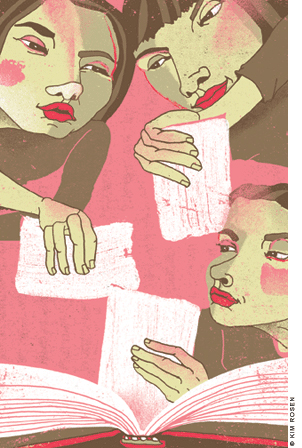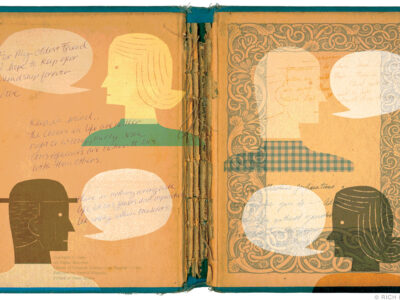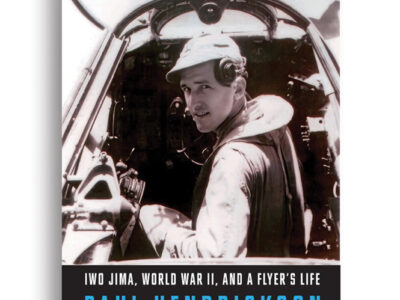
Three Penn alumnae help each other breathe new life into old chick-lit forms.
What separates the work of Julie Buxbaum C’99, Laura Dave C’99, and Allison Winn Scotch C’95 from the crowded contemporary women’s fiction market is the minds of their protagonists. The women they write about are highly perceptive and prone to analyzing the social constructs that surround them. Yes, some of their characters care about shopping and shoes. And yes, there’s a lot of talk about weddings and love. But more important is that the novels they write are accurate and interesting reflections of the struggles and joys that women encounter today.
Their work revolves around female protagonists at turning points in their lives. Whether it’s getting slammed with a diagnosis of breast cancer (like Natalie in Scotch’s The Department of Lost & Found), or questioning proposals of marriage (Maggie in Dave’s The Divorce Party and Emmy in Dave’s London is the Best City in America), or evaluating the strength of long-term relationships (Emily in Buxbaum’s The Opposite of Love and Jillian in Scotch’s Time of My Life), the main characters all struggle to define their lives in light of some recent upheaval.
The call-waiting beeps on Dave’s phone in Los Angeles.
“That was Allison,” says Dave when she returns to the line. “We haven’t seen each other in a little while, so she was just calling from New York to check in.”
Long-distance relationships can be challenging, but the professional support network and personal friendship shared by Buxbaum, Dave, and Scotch thrives despite their respective locations of London, Los Angeles, and New York. Since all three women have built successful careers spinning tales about the complexities of personal relationships—and can boast five best-selling novels, three Hollywood movie contracts, a screenplay, and several works-in-progress among them—they may have an unfair advantage when it comes to communication.
Maybe the aftermath of loss – the crumbs of memory – has, in some ways, scarred me more than the loss itself … This is who I am: someone who simultaneously longs for and fears the commitment of remembering. There is the forgetting, the disintegration of memory, morsel by morsel; and there is the impossibility of forgetting, the scar tissue, with its insulated layers of padding. Both haunt me in their own way.
—From The Opposite of Love, by Julie Buxbaum.
Though they did not know each other during their undergrad days, it was the Penn connection that brought them together.
“I had been following Allison and Laura’s careers and knew they both went to Penn,” explains Buxbaum, who ditched a promising career as a lawyer to write The Opposite of Love and the forthcoming After You. “When I finished my own book and got in touch with them, they were both immediately responsive. Since then, they have become the first people I turn to.
“When you write a book and put it out in the world, it’s terrifying,” she adds. “They helped me through the neurosis of being a new writer.” Likewise, Dave and Scotch initially bonded over their Penn roots, which included a common sorority.
“When you meet people who go to Penn, knowing that we all had that shared experience, it gave us more of a reason to pursue a friendship,” says Scotch. “It’s really nice to have allies when so much of your job is solitary. Laura, Julie, and I understand each other and we do everything we can to help each other get to the next stage.”
… maybe it made some kind of sense that it would be easier for people to act most like themselves when they were pretending to be someone else. This could also explain why so many old-school wedding superstitions were wrapped up in All Hallows’ Eve. Young brides-to-be used to stand around a fire holding stringed apples over the flames. Legend went that the young woman whose apple fell would marry first and have the longest and happiest union. The one whose apple fell last would have the toughest time. Young grooms, meanwhile, would crawl under a blackberry bush in their costumes. And when they reached the other side, they would receive instructions on whether their union was fated for bliss or destruction. Forever now, apparently, relationships coming together or falling apart based on what ghosts said.
—From London is the Best City in America, by Laura Dave.
That help includes critiquing each other’s manuscripts, blurbing each other’s books, attending each other’s readings (“A writer’s worst fear is showing up for their first reading and having no one there,” says Buxbaum), and swapping book-industry advice. (When Scotch’s latest book was profiled in American Airlines’ in-flight magazine, it was Dave who suggested that Scotch’s publishing house make an extra push to promote the book in airport bookstores.)
“We have different strengths,” says Scotch. “I’m a pretty proactive person, so I might encourage Laura, for example, to speak up more in a situation in which she’s unhappy with something—whereas she’s a really creative, intuitive person, and she’ll come up with all sorts of ways to spread the word about our books that never would have dawned on me.”
In real life, most marriages don’t come undone with one big explosion … Most marriages unravel slowly, slipping drop by drop, like water ebbing through a curled palm, until one day, you look down and notice that it, your hand, is entirely empty. That’s how most marriages dissolve and run dry. And, in retrospect, it’s how mine came undone exactly.
The days when Katie was a newborn dragged on endlessly. I would sit on our front porch and try to urge the sun to go down; the sooner that nightfall came, the sooner we would be putting this wretched day behind us, I’d think, ignoring the obvious fact that I’d have to wake up and do it all over again. I would rock on our porch swing and think, No one tells you that it’s going to be like this. No one says that this will be the hardest thing you’ve ever done. That it’s not just puffs of pink and baby coos and sweet rosy cheeks. Why didn’t anyone warn me? But then, when Katie would quiet herself, and I’d rub her back while she dozed in her crib, I’d palpably feel it – the absence of loneliness that too often plagued me – and my face would flare with shame, as if crawling with tiny fire ants, that I ever had moments of regret. And then I’d push all of it aside and wrap myself into the package of a perfect mother. Above everything, that is what I did best.
—From Time of My Life, by Allison Winn Scotch.
One thing they have in common is the themes they pursue in their writing: the struggle to find one’s place in the world, the complexities of relationships with parents and grandparents, the search for true love and the shedding of flawed love.
According to Stephanie Harzewski, a postdoc in Penn’s English department who is in the process of turning her Ph.D. dissertation into a book (tentatively titled “The New Novel of Manners: Chick Lit and Postfeminist Politics, 1996-2006”), the urban locales of these writers may have more to do with the direction of their novels than their shared experience on the Penn campus.
“These authors are themselves coming of age in a city, and the city has been the archetypal site for the coming-of-age story,” explains Harzewski. “It makes sense that their novels, for and by women, should have the quest and a plot of self-discovery at their core. Cities give some women the sense that they are heroines and are active in writing their own story, their own happy ending.
“The tug of war over competing plot-lines, so to speak, is not confined to just female Penn students, but is part of being a modern woman, with the frustrations and choices that accompany that,” Harzewski adds. “Still, detours or not, the city is sympathetic to the idea of women on a creative or personal journey.”
In Time of My Life, that creative personal journey takes the form of a parallel reality, as Scotch’s Jillian—a young mother struggling with a suburban life that is far more challenging than she could have imagined—wakes up one morning to find that she has been given a chance to continue living the Manhattan life she had left behind when she got married. Yet she still remembers the other journey, one she embarked upon with her husband, whom she rejoins on New Year’s Eve:
I watch him watching the revelry. His straight nose and his creamy skin and his pillow lips, so much like our daughter’s, the little girl who isn’t even yet a blip, a seed in his mind. How could she be, after all? I think. He can’t know what the future brings. But then I consider that now, lost in the maze between what has happened in the past and what has already transpired in the future, neither can I know what the future brings.
In the end, what transforms all these possibilities into published reality is hard work.
“We’re all very disciplined about our work,” says Dave. “I think learning the importance of sitting down and writing every day started at Penn.”
—Jennifer Blecher C’01




